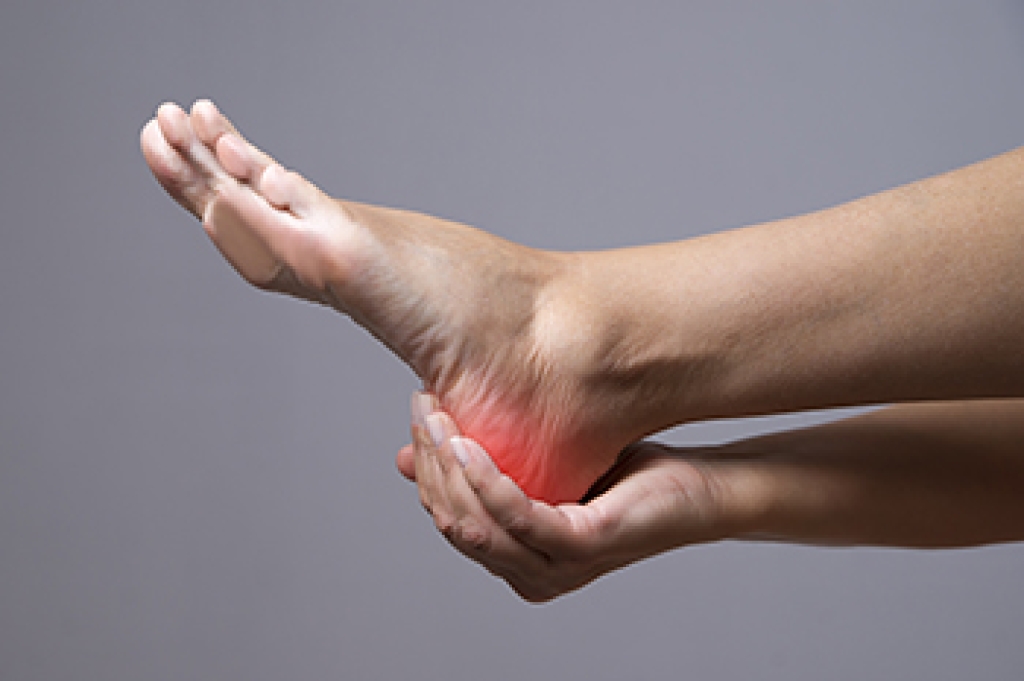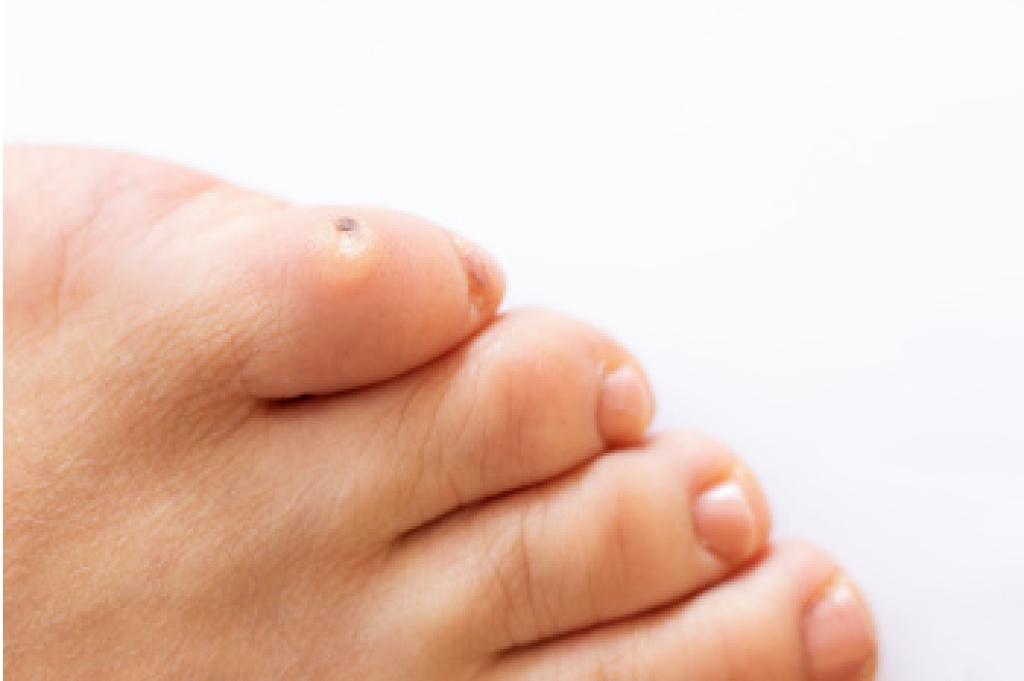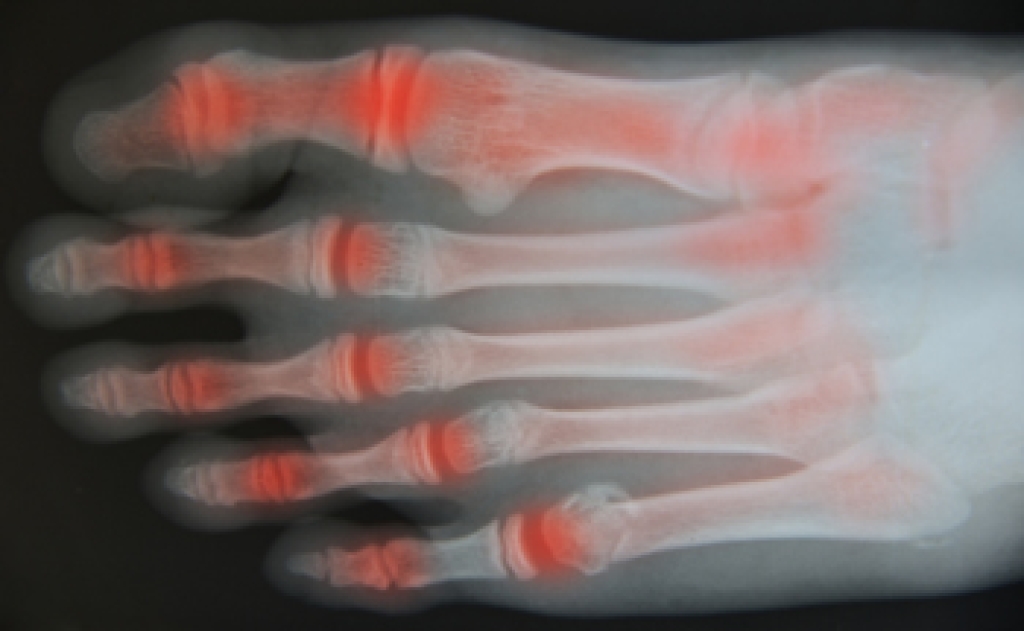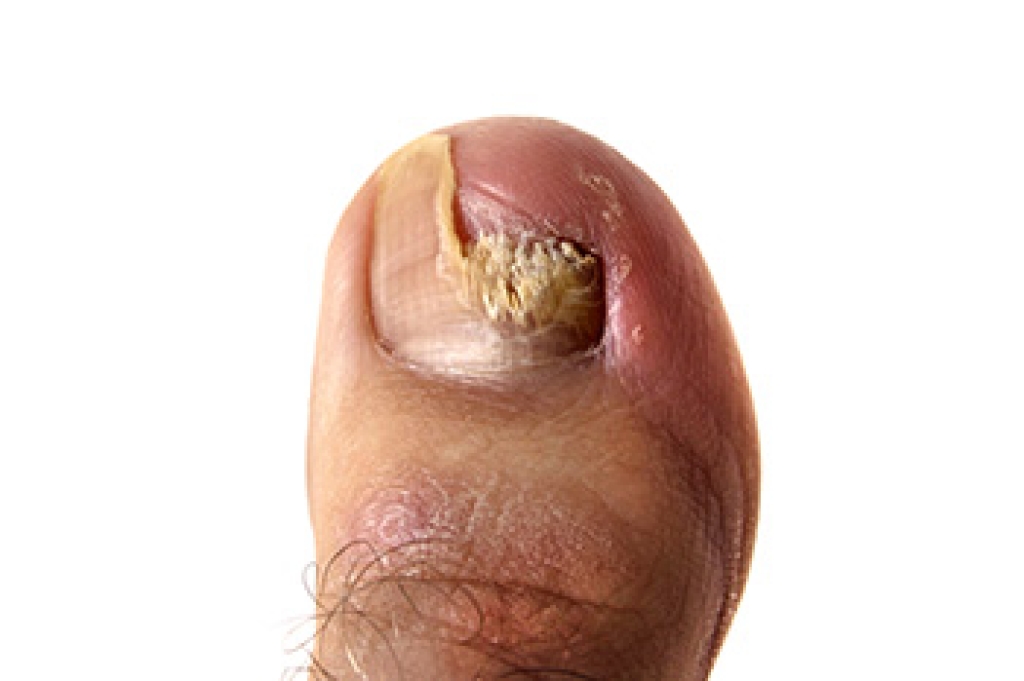Connect With Us
Blog
Blog
Frequent Causes of Lateral Foot Pain

Pain on the outer side of the foot, known as lateral foot pain, can result from a variety of conditions that affect the bones, tendons, and ligaments in this area. A common cause of lateral foot pain is peroneal tendonitis. This develops where the tendons running along the ankle and foot become inflamed due to overuse or injury. Ankle sprains are another frequent source, often occurring when the ankle twists inward. This action can cause tearing of the supporting ligaments and leads to swelling and instability. Fractures of the fifth metatarsal, sometimes called dancer’s fractures or Jones fractures, may arise from repetitive stress or acute trauma. A podiatrist can evaluate the exact cause of lateral foot pain, provide diagnostic imaging to confirm, and recommend the most effective treatment. If the outer side of your foot hurts, it is suggested that you make an appointment with a podiatrist for an exam and treatment.
Foot Pain
Foot pain can be extremely painful and debilitating. If you have a foot pain, consult with one of our podiatrists from APEX Foot & Ankle Center. Our doctors will assess your condition and provide you with quality foot and ankle treatment.
Causes
Foot pain is a very broad condition that could be caused by one or more ailments. The most common include:
- Bunions
- Hammertoes
- Plantar Fasciitis
- Bone Spurs
- Corns
- Tarsal Tunnel Syndrome
- Ingrown Toenails
- Arthritis (such as Gout, Rheumatoid, and Osteoarthritis)
- Flat Feet
- Injury (from stress fractures, broken toe, foot, ankle, Achilles tendon ruptures, and sprains)
- And more
Diagnosis
To figure out the cause of foot pain, podiatrists utilize several different methods. This can range from simple visual inspections and sensation tests to X-rays and MRI scans. Prior medical history, family medical history, and any recent physical traumatic events will all be taken into consideration for a proper diagnosis.
Treatment
Treatment depends upon the cause of the foot pain. Whether it is resting, staying off the foot, or having surgery; podiatrists have a number of treatment options available for foot pain.
If you have any questions, please feel free to contact our offices located in Fort Myers, Shellpoint, and Naples, FL . We offer the newest diagnostic and treatment technologies for all your foot care needs.
Heel Pain and a Podiatrist’s Role in Relief

Heel pain occurs when the structures that support the foot become strained or irritated. It often develops from repeated stress on the heel, which can lead to inflammation and discomfort with daily activities. Middle aged adults, active individuals, people who are overweight, and those who stand for long periods of time are at higher risk because their heels experience greater pressure. Symptoms include sharp pain when taking the first steps in the morning, aching after activity, or tenderness along the bottom or back of the heel. A podiatrist can identify the cause, ease inflammation, improve foot alignment, and create a personalized treatment plan. If heel pain is affecting your mobility, it is suggested that you consult a podiatrist who can offer effective treatment solutions.
Many people suffer from bouts of heel pain. For more information, contact one of our podiatrists of APEX Foot & Ankle Center. Our doctors can provide the care you need to keep you pain-free and on your feet.
Causes of Heel Pain
Heel pain is often associated with plantar fasciitis. The plantar fascia is a band of tissues that extends along the bottom of the foot. A rip or tear in this ligament can cause inflammation of the tissue.
Achilles tendonitis is another cause of heel pain. Inflammation of the Achilles tendon will cause pain from fractures and muscle tearing. Lack of flexibility is also another symptom.
Heel spurs are another cause of pain. When the tissues of the plantar fascia undergo a great deal of stress, it can lead to ligament separation from the heel bone, causing heel spurs.
Why Might Heel Pain Occur?
- Wearing ill-fitting shoes
- Wearing non-supportive shoes
- Weight change
- Excessive running
Treatments
Heel pain should be treated as soon as possible for immediate results. Keeping your feet in a stress-free environment will help. If you suffer from Achilles tendonitis or plantar fasciitis, applying ice will reduce the swelling. Stretching before an exercise like running will help the muscles. Using all these tips will help make heel pain a condition of the past.
If you have any questions, please feel free to contact our offices located in Fort Myers, Shellpoint, and Naples, FL . We offer the newest diagnostic and treatment technologies for all your foot care needs.
Risk Factors for Developing Foot Corns

A foot corn is a thickened area of skin that develops from repeated friction or pressure, usually on the toes or soles. Corns form as a protective response but can become painful when they press into deeper tissues. Common causes include wearing tight shoes, abnormal foot structure, or high levels of physical activity. Symptoms often include tenderness or discomfort while walking, especially on a rough, hardened surface. People with diabetes or poor circulation are at a greater risk of complications. A podiatrist can safely remove corns, address the underlying cause, and recommend custom footwear or custom orthotics to prevent recurrence. If you have pain or difficulty walking due to corns, it is suggested that you consult a podiatrist who can provide effective relief and prevention tips.
If you have any concerns regarding your feet and ankles, contact one of our podiatrists of APEX Foot & Ankle Center. Our doctors will treat your foot and ankle needs.
Corns: What Are They? and How Do You Get Rid of Them?
Corns can be described as areas of the skin that have thickened to the point of becoming painful or irritating. They are often layers and layers of the skin that have become dry and rough, and are normally smaller than calluses.
Ways to Prevent Corns
There are many ways to get rid of painful corns such as wearing:
- Well-fitting socks
- Comfortable shoes that are not tight around your foot
- Shoes that offer support
Treating Corns
Treatment of corns involves removing the dead skin that has built up in the specific area of the foot. Consult with Our doctors to determine the best treatment option for your case of corns.
If you have any questions, please feel free to contact our offices located in Fort Myers, Shellpoint, and Naples, FL . We offer the newest diagnostic and treatment technologies for all your foot care needs.
Definition of Cracked Heels

Cracked heels occur when the skin on the heel becomes dry, thick, and loses elasticity, leading to painful splits or fissures. They often develop from a combination of physiological predisposition, environmental factors, chemical irritants, and repeated stress on the feet from standing or walking on hard surfaces. These cracks can worsen over time and may even become infected, if untreated. A podiatrist can assess the severity, remove thickened skin safely, recommend protective treatments, and address underlying causes, such as abnormal gait or footwear. Do not let dry heels cause discomfort. If you have developed this uncomfortable condition, it is suggested that you consult a podiatrist who can effectively treat cracked heels, which may include prescribed medication.
If the skin on your feet starts to crack, you may want to see a podiatrist to find treatment. If you have any concerns, contact one of our podiatrists from APEX Foot & Ankle Center. Our doctors can provide the care you need to keep you pain-free and on your feet.
Cracked Heels
It is important to moisturize your cracked heels in order to prevent pain, bleeding, and infection. The reason cracked heels form is because the skin on the foot is too dry to support the immense pressure placed on them. When the foot expands, the dry skin on the foot begins to split.
Ways to Help Heal Them
- Invest in a good foot cream
- Try Using Petroleum Jelly
- Ease up on Soaps
- Drink Plenty of Water
Ways to Prevent Cracked Heels
- Moisturize After Showering
- Skip a Shower
- Keep Shower Water Lukewarm
- Don’t Scrub Your Feet
If you are unsure how to proceed in treating cracked heels, seek guidance from a podiatrist. Your doctor will help you with any questions or information you may need.
If you have any questions, please feel free to contact our offices located in Fort Myers, Shellpoint, and Naples, FL . We offer the newest diagnostic and treatment technologies for all your foot care needs.
How to Manage Foot Arthritis

Foot arthritis causes inflammation and damage to the joints of the foot, leading to pain, stiffness, and reduced mobility. Osteoarthritis results from wear and tear of the joint cartilage over time. Rheumatoid arthritis is an autoimmune condition where the body attacks its own joints, causing swelling and deformity. Additionally, post-traumatic arthritis develops after an injury or fracture, while gout occurs when uric acid crystals accumulate in the joint, causing sudden and severe pain. A podiatrist can diagnose the specific type of arthritis, recommend treatments such as custom orthotics or medication, and provide guidance to improve mobility. If you have symptoms of arthritis in your feet, it is suggested that you are under the care of a podiatrist.
Arthritis can be a difficult condition to live with. If you are seeking treatment, contact one of our podiatrists from APEX Foot & Ankle Center. Our doctors can provide the care you need to keep you pain-free and on your feet.
Arthritic Foot Care
Arthritis is a term that is commonly used to describe joint pain. The condition itself can occur to anyone of any age, race, or gender, and there are over 100 types of it. Nevertheless, arthritis is more commonly found in women compared to men, and it is also more prevalent in those who are overweight. The causes of arthritis vary depending on which type of arthritis you have. Osteoarthritis for example, is often caused by injury, while rheumatoid arthritis is caused by a misdirected immune system.
Symptoms
- Swelling
- Pain
- Stiffness
- Decreased Range of Motion
Arthritic symptoms range in severity, and they may come and go. Some symptoms stay the same for several years but could potentially get worse with time. Severe cases of arthritis can prevent its sufferers from performing daily activities and make walking difficult.
Risk Factors
- Occupation – Occupations requiring repetitive knee movements have been linked to osteoarthritis
- Obesity – Excess weight can contribute to osteoarthritis development
- Infection – Microbial agents can infect the joints and trigger arthritis
- Joint Injuries – Damage to joints may lead to osteoarthritis
- Age – Risk increases with age
- Gender –Most types are more common in women
- Genetics – Arthritis can be hereditary
If you suspect your arthritis is affecting your feet, it is crucial that you see a podiatrist immediately. Your doctor will be able to address your specific case and help you decide which treatment method is best for you.
If you have any questions please feel free to contact our offices located in Fort Myers, Shellpoint, and Naples, FL . We offer the newest diagnostic tools and technology to treat your foot and ankle needs.
What That Discolored Toenail Could Really Mean

Toenail fungus, also known as onychomycosis, is a common condition caused by fungal organisms that thrive in warm, moist environments, such as sweaty shoes or public showers. It often begins as a small white or yellow spot under the nail and can spread deeper, causing the nail to thicken, discolor, become brittle, and sometimes emit a foul odor. The nail may appear distorted in shape and can separate from the nail bed, leading to discomfort or pain while walking or wearing shoes. People with diabetes, circulation problems, or a history of athlete’s foot are more prone to infection. A podiatrist can diagnose toenail fungus through a clinical exam and lab testing of nail clippings. Treatment options include topical antifungal medications or oral prescriptions depending on the severity of the infection. Early treatment helps prevent permanent nail damage and spread to other nails. It is suggested that you schedule an appointment with a podiatrist if you notice changes in the appearance or texture of your toenails.
If left untreated, toenail fungus may spread to other toenails, skin, or even fingernails. If you suspect you have toenail fungus it is important to seek treatment right away. For more information about treatment, contact one of our podiatrists of APEX Foot & Ankle Center. Our doctors can provide the care you need to keep you pain-free and on your feet.
Symptoms
- Warped or oddly shaped nails
- Yellowish nails
- Loose/separated nail
- Buildup of bits and pieces of nail fragments under the nail
- Brittle, broken, thickened nail
Treatment
If self-care strategies and over-the-counter medications does not help your fungus, your podiatrist may give you a prescription drug instead. Even if you find relief from your toenail fungus symptoms, you may experience a repeat infection in the future.
Prevention
In order to prevent getting toenail fungus in the future, you should always make sure to wash your feet with soap and water. After washing, it is important to dry your feet thoroughly especially in between the toes. When trimming your toenails, be sure to trim straight across instead of in a rounded shape. It is crucial not to cover up discolored nails with nail polish because that will prevent your nail from being able to “breathe”.
In some cases, surgical procedure may be needed to remove the toenail fungus. Consult with your podiatrist about the best treatment options for your case of toenail fungus.
If you have any questions please contact our offices located in Fort Myers, Shellpoint, and Naples, FL . We offer the newest diagnostic and treatment technologies for all your foot and ankle needs.
How Poorly Fitted Shoes Can Lead to Foot Pain and Injury

Wearing shoes that do not fit properly can cause more than just temporary discomfort. Over time, tight, loose, or unsupportive footwear can lead to a range of painful foot problems. Common issues include blisters, calluses, corns, and ingrown toenails, as well as more serious conditions, such as bunions, hammertoes, and plantar fasciitis. Wearing ill-fitting shoes can also alter natural walking patterns, creating strain on the ankles, knees, hips, and lower back. Choosing footwear that supports the shape of your foot, provides proper cushioning, and allows enough space for your toes to move freely is essential for maintaining foot health. Custom orthotics may be recommended for individuals with structural imbalances or chronic pain. If you experience ongoing soreness or changes in your feet, it is suggested that you consult a podiatrist for a professional assessment and guidance on selecting shoes that promote comfort, balance, and long-term mobility.
Finding a properly-fitting shoe is important in reducing injuries and preventing foot problems. For more information about treatment, contact one of our podiatrists from APEX Foot & Ankle Center. Our doctors will treat your foot and ankle needs.
Proper Shoe Fitting
A common concern when it comes to foot health, having properly fitted shoes can help prevent injuries to the foot. Out feet affect our posture and gait, which in turn affects the biomechanics and overall bodily structure. With 33 joints, 26 bones, and over 100 ligaments, the potential for serious injury is much greater than one realizes. Although the feet cease growth in adulthood, they still change shape as they mature. Here are some factors to consider when it comes to investing in proper fitting shoes:
- Be sure the shoes fit correctly right away
- Ensure the ball of your foot fits comfortably in the widest portion of the shoes
- Even though they may look fashionable, improper fitting shoes can either create adverse conditions or exacerbate existing ones you may already have
- Walk along a carpeted surface to ensure the shoes comfortably fit during normal activity
Keeping in mind how shoes fit the biomechanics of your body, properly-fitting shoes are vitally important. Fortunately, it is not difficult to acquire footwear that fits correctly. Be sure to wear shoes that support the overall structure of your body. Do your feet a favor and invest in several pairs of well-fitted shoes today.
If you have any questions, please feel free to contact our offices located in Fort Myers, Shellpoint, and Naples, FL . We offer the newest diagnostic and treatment technologies for all your foot care needs.
What Can Cause an Ankle Sprain in Volleyball?

A sprained ankle is one of the most frequent injuries in volleyball and happens when the ligaments that support the ankle are stretched or torn. Quick movements, jumping, spiking, or blocking often lead to awkward landings that place excess force on the joint. Sprains are classified by degrees of severity. A mild sprain, or first degree, involves slight stretching with minor pain and swelling. A moderate sprain, or second degree, includes partial tearing with noticeable bruising and difficulty walking. A severe sprain, also known as third degree, involves complete ligament tearing, significant swelling, and instability. A podiatrist can assess the degree of injury, provide treatment, and create a rehabilitation plan to restore strength and prevent re-injury. If you have sprained your ankle while playing volleyball, it is suggested that you promptly contact a podiatrist who can begin the appropriate treatment for recovery.
Sports related foot and ankle injuries require proper treatment before players can go back to their regular routines. For more information, contact one of our podiatrists of APEX Foot & Ankle Center. Our doctors can provide the care you need to keep you pain-free and on your feet.
Sports Related Foot and Ankle Injuries
Foot and ankle injuries are a common occurrence when it comes to athletes of any sport. While many athletes dismiss the initial aches and pains, the truth is that ignoring potential foot and ankle injuries can lead to serious problems. As athletes continue to place pressure and strain the area further, a mild injury can turn into something as serious as a rupture and may lead to a permanent disability. There are many factors that contribute to sports related foot and ankle injuries, which include failure to warm up properly, not providing support or wearing bad footwear. Common injuries and conditions athletes face, including:
- Plantar Fasciitis
- Achilles Tendinitis
- Achilles Tendon Rupture
- Ankle Sprains
Sports related injuries are commonly treated using the RICE method. This includes rest, applying ice to the injured area, compression and elevating the ankle. More serious sprains and injuries may require surgery, which could include arthroscopic and reconstructive surgery. Rehabilitation and therapy may also be required in order to get any recovering athlete to become fully functional again. Any unusual aches and pains an athlete sustains must be evaluated by a licensed, reputable medical professional.
If you have any questions please contact our offices located in Fort Myers, Shellpoint, and Naples, FL . We offer the newest diagnostic and treatment technologies for all your foot and ankle needs.
Blog Archives
- 2025
- 2024
- 2023
- 2022
- 2021
- 2020
- 2019
- 2018
- 2017

